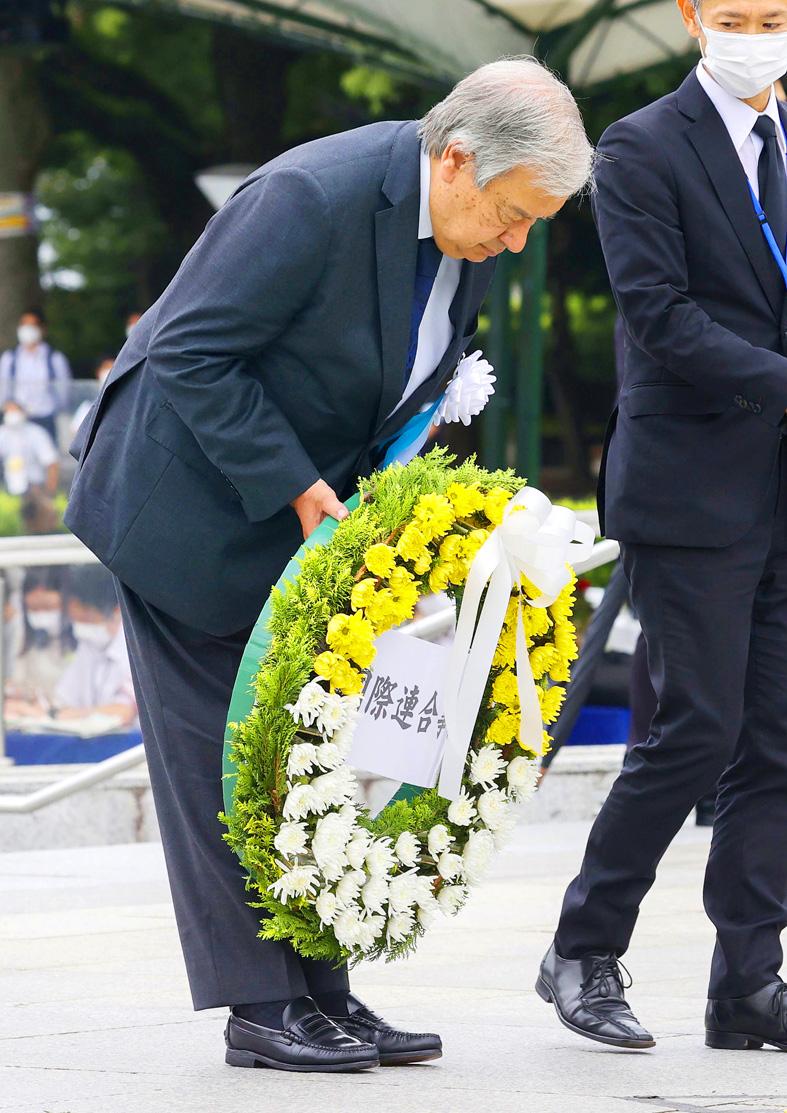“Humanity is playing with a loaded gun” as crises with the potential for nuclear disaster proliferate worldwide, UN Secretary-General Antonio Guterres said in Hiroshima yesterday, the 77th anniversary of the first atomic bomb attack.
At an annual memorial in the Japanese city, Guterres warned of the risk posed by crises in Ukraine, the Middle East and the Korean Peninsula as he described the horrors endured by people in Hiroshima.
“Tens of thousands of people were killed in this city in the blink of an eye. Women, children and men were incinerated in a hellish fire,” he said, adding that survivors were “cursed with a radioactive legacy” of cancer and other health problems.

Photo: AP
“We must ask: What have we learned from the mushroom cloud that swelled above this city?” he asked.
About 140,000 people died when Hiroshima was bombed by the US on Aug. 6, 1945, a toll that includes those who perished after the blast from radiation exposure.
Today, “crises with grave nuclear undertones are spreading fast,” Guterres said, repeating warnings he made this week at a Treaty on the Non-Proliferation of Nuclear Weapons conference in New York.
“Humanity is playing with a loaded gun,” he said.
Before dawn, survivors and their relatives began to gather at the Hiroshima Peace Memorial Park to pay tribute to the victims.
A silent prayer was held at 8:15am, the moment a US warplane dropped the bomb 77 years earlier.
The Russian ambassador to Japan was not invited to the ceremony, but visited Hiroshima on Thursday to lay flowers at the memorial site.
Since Moscow invaded Ukraine in February, Russian President Vladimir Putin has made thinly veiled threats hinting at a willingness to deploy tactical nuclear weapons.
In a speech yesterday, Hiroshima Mayor Kazumi Matsui cited Leo Tolstoy, the Russian author of War and Peace, saying: “Never build your happiness on the misfortune of others, for only in their happiness can you find your own.”
Three days after the Hiroshima bombing, Washington dropped a second atomic bomb on the Japanese port city of Nagasaki, killing about 74,000 people and leading to the end of World War II.
There are now fewer than 119,000 officially recognized survivors of the two nuclear attacks, Japanese government data showed in March.
The US remains the only country ever to have used nuclear weapons in conflict.
However, about 13,000 nuclear warheads are held in state arsenals worldwide, Guterres said.
Yesterday was the first time Guterres attended the Hiroshima memorial in person as UN head, with a visit last year canceled because of the COVID-19 pandemic.

Malaysia yesterday installed a motorcycle-riding billionaire sultan as its new king in lavish ceremonies for a post seen as a ballast in times of political crises. The coronation ceremony for Malaysia’s King Sultan Ibrahim, 65, at the National Palace in Kuala Lumpur followed his oath-taking in January as the country’s 17th monarch. Malaysia is a constitutional monarchy, with a unique arrangement that sees the throne change hands every five years between the rulers of nine Malaysian states headed by centuries-old Islamic royalty. While chiefly ceremonial, the position of king has in the past few years played an increasingly important role. Royal intervention was

X-37B COMPARISON: China’s spaceplane is most likely testing technology, much like US’ vehicle, said Victoria Samson, an official at the Secure World Foundation China’s shadowy, uncrewed reusable spacecraft, which launches atop a rocket booster and lands at a secretive military airfield, is most likely testing technology, but could also be used for manipulating or retrieving satellites, experts said. The spacecraft, on its third mission, was last month observed releasing an object, moving several kilometers away and then maneuvering back to within a few hundred meters of it. “It’s obvious that it has a military application, including, for example, closely inspecting objects of the enemy or disabling them, but it also has non-military applications,” said Marco Langbroek, a lecturer in optical space situational awareness at Delft

The Philippine Air Force must ramp up pilot training if it is to buy 20 or more multirole fighter jets as it modernizes and expands joint operations with its navy, a commander said yesterday. A day earlier US National Security Adviser Jake Sullivan said that the US “will do what is necessary” to see that the Philippines is able to resupply a ship on the Second Thomas Shoal (Renai Shoal, 仁愛暗沙) that Manila uses to reinforce its claims to the atoll. Sullivan said the US would prefer that the Philippines conducts the resupplies of the small crew on the warship Sierra Madre,

AIRLINES RECOVERING: Two-thirds of the flights canceled on Saturday due to the faulty CrowdStrike update that hit 8.5 million devices worldwide occurred in the US As the world continues to recover from massive business and travel disruptions caused by a faulty software update from cybersecurity firm CrowdStrike, malicious actors are trying to exploit the situation for their own gain. Government cybersecurity agencies across the globe and CrowdStrike CEO George Kurtz are warning businesses and individuals around the world about new phishing schemes that involve malicious actors posing as CrowdStrike employees or other tech specialists offering to assist those recovering from the outage. “We know that adversaries and bad actors will try to exploit events like this,” Kurtz said in a statement. “I encourage everyone to remain vigilant